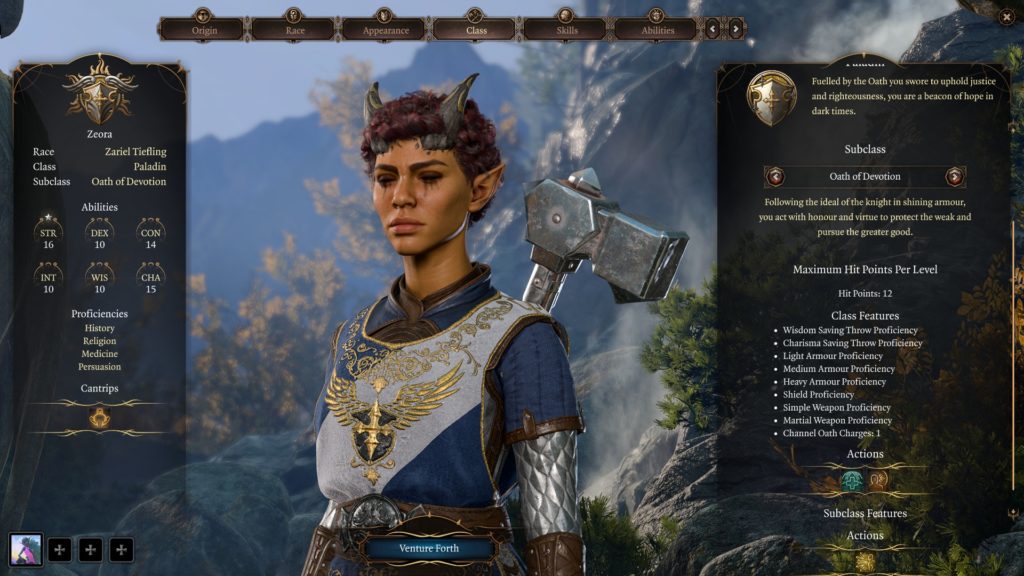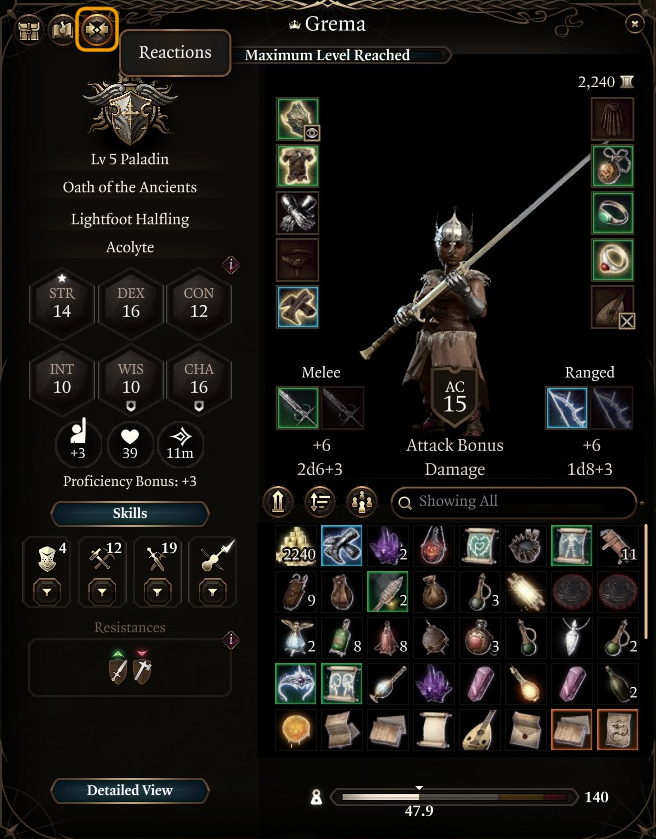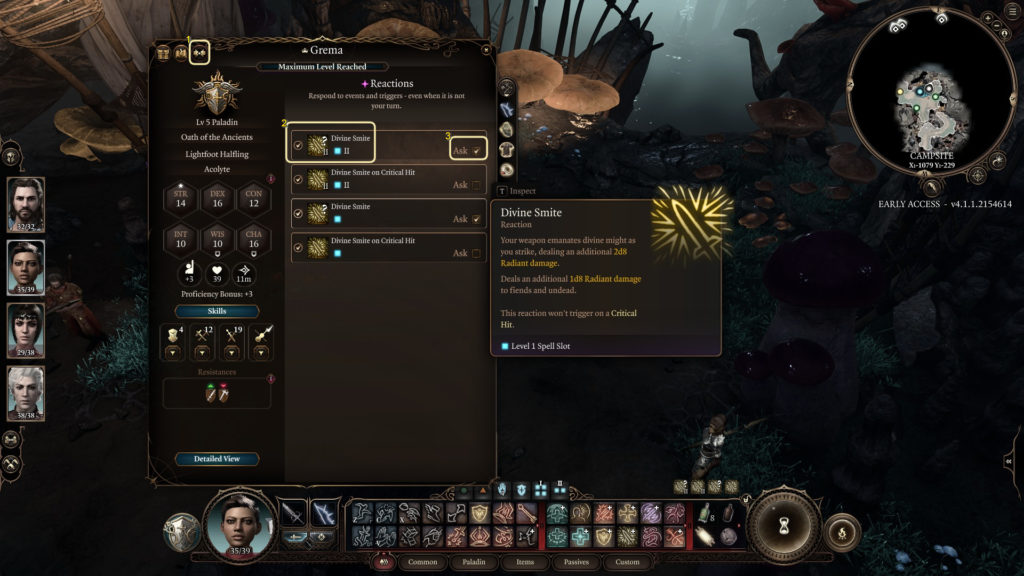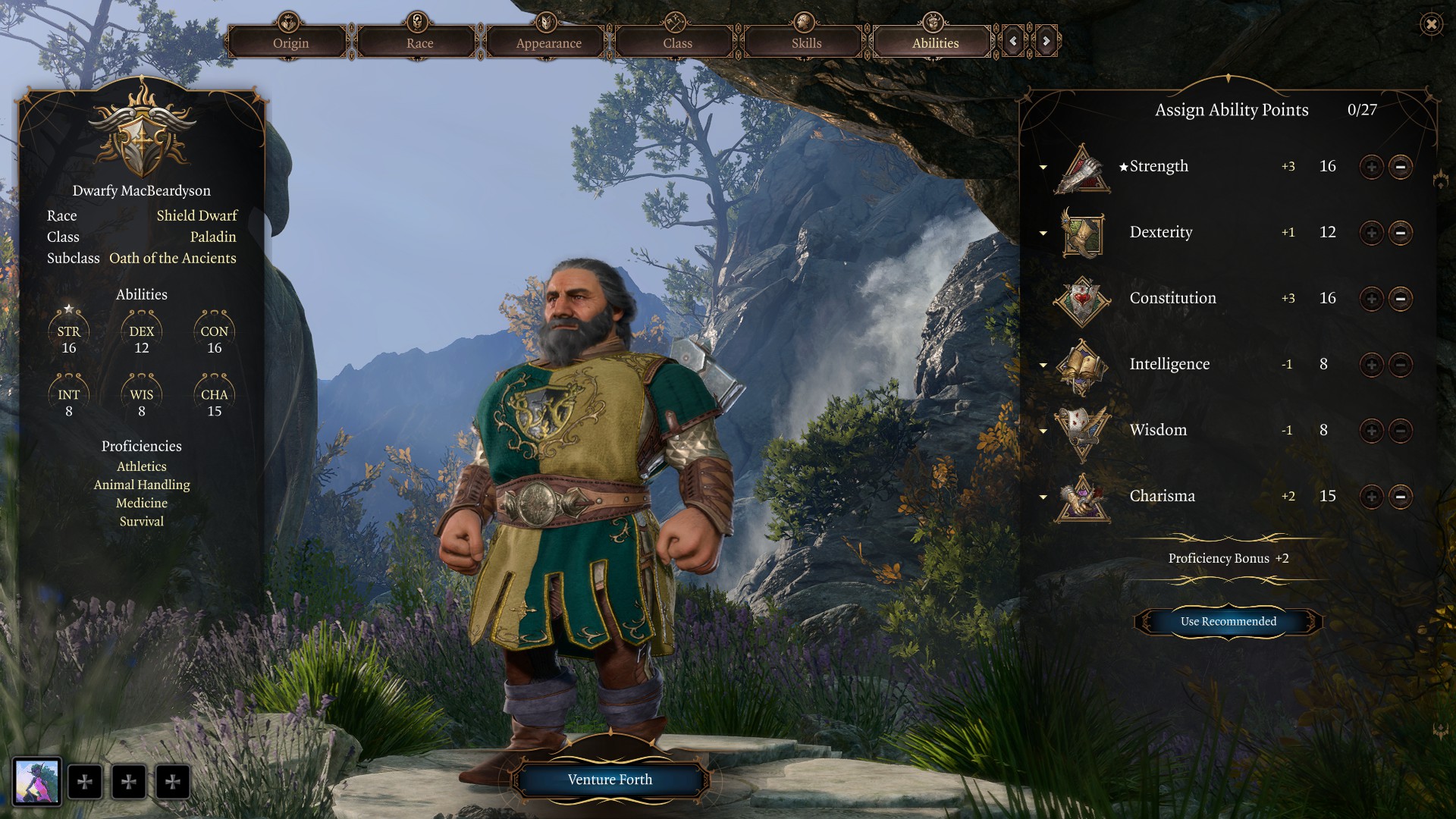In Dungeons and Dragons, Paladin is the the heavy-hitting, tanking, healing, persuasive knight in shining armor…depending on the GM. Baldur’s Gate 3 faithfully captures the Dungeon’s and Dragon’s experience of playing these do-it-all knights, right down to people calling you a goody-two-shoes and rolling their eyes at you when you won’t make a deal with the village Hag. Like most character options in this game, NPCs react differently to you based on your class, race, and in-game choices. Some NPCs react to your class-specific dialogue with respect, deferring to your judgement as a paladin…others mock your puny heroics and roll initiative.
Role-play is not optional. Paladin is unique in that if you don’t stick to the terms of your oath, your subclass changes. The dev-team at Larian says “killing innocents” or betraying the Druid Grove will break most oaths, which translates in gameplay terms to attacking non-hostile NPCs. This is not the class to pick if you want to mindlessly hack and slash without repercussions – that’s Barbarian. If you pick this class, the game holds you to account for your choices.
Note: At time of writing, Baldur’s Gate 3 is in early access and things may change.
Choose an Oath:

Your oath sets the stage for your roleplay experience. Unlike in the tabletop game, here you choose your oath at first level and get a unique ability depending on what you choose. Check the wiki for a full rundown of spells and abilities.
Oath of Devotion – This is a classic Lawful Good knight in shining armor. Think Superman and Captain America. You’re fighting for truth, justice, and the Faerunian way, you don’t lie or steal, and you uphold just authority. Your level 1 ability, new to BG3, lets you cloak an ally in a holy aura and deal a small amount of radiant damage back to anything that hits them.
Oath of the Ancients – This is almost more of a druid, nature warden type of deal. You’re here to spread hope, joy, and maintain the natural order. You get a very useful area-of-effect healing ability at level 1, access to the very useful Ensnaring Strike, and Speak with Animals, which unlocks a lot of roleplay content. Also, you get Moonbeam, an excellent area of effect spell typically only available to Druids.
Oathbreaker – This one isn’t a starting option – odds are you’ll stumble across it by, you guessed it, breaking your oath. It unlocks a very cool NPC though, so it’s worth a look even if your RPG playstyle is to pet all the dogs and help every orphan. Oathbreakers can summon undead to help them fight, and get a few typically Warlock-exclusive spells like Hellish Rebuke and Armor of Agathys, which both let you deal damage back at whatever just damaged you.
Build Your Paladin:
You’ll have the easiest time playing as a classic strength-focused melee fighter:
- Put as many points as possible into Strength, then Constitution.
- Charisma isn’t really required, at least if you just want to be effective in combat. You don’t need a high spell save DC or a lot of prepared spells, because you’re saving your spell slots for Divine Smite.
- Gear up: Your class starts with chain-mail, a warhammer and shield, and a few javelins. To use your javelins, drag and drop them onto your item hotbar so you can quickly throw them in combat.
- Fighting Style: Pick anything except protection, which is hard to actually use in normal gameplay.
- Fish for crits by attacking prone, blinded, or flanked enemies.
- Races: Dwarves, Humans, Githyanki, and Zariel Tieflings get bonuses to Strength.
Now that’s what the game’s designed for you to do, but I didn’t do that.
“Your key ability is Strength–“

Dexterity-based paladins are totally viable:
- Put your highest stat in Dexterity.
- You need a 13 in strength to avoid penalties for wearing heavy armor in the introduction, but other than that, you don’t need strength.
- Oath of the Ancients gives you Ensnaring Strike, which works with ranged attacks (unlike smite spells).
- Gear up: Snag a rapier or dagger early on to use dexterity in melee combat. The early game gives you lots of options for light or medium armor that boost your healing capabilities.
- Fighting Style: Take dueling if you want to do a bit more damage with your rapier, defense if you want to get hit less.
- This is a good option for Elves, Drow, and Halflings, which get bonuses to Dexterity but not Strength.
And finally, the Charisma Tank.
This build lets you be useful to your team by just standing there. I don’t recommend this for early access, since your level is capped at 5 and you won’t have access to higher level defensive abilities like Aura of Protection. (Which means Baldur’s Gate 3 provides you with the most authentic TTRPG experience: not getting to play past level 5 because the campaign ended early.)
- Put your highest stat in Charisma, then Strength or Constitution.
- Take a minimum of 13 strength so you can wear your starting armor and still cast spells.
- Any oath will do.
- Spells:
- Compelled Duel forces an enemy to target you instead of the squishy wizard.
- Shield of Faith grants you or an ally an additional +2 to AC.
- Bless gives three people a buff to attacks and saving throws.
- For Oath of the Ancients, Moonbeam does radiant damage in an area of effect and you can move it every turn. Use it to deny enemies access to areas of the map.
- Fighting Style: Take defense for a small bonus to AC.
- Gear up: Grab a shield and hunker down.
- At level 4, get a cantrip by taking the Magic Initiate (Bard, Warlock, or Sorcerer) feat at level 4. Fire Bolt or Eldritch Blast are solid picks. These scale off of your charisma, so you’ll have a solid to-hit bonus.
- Races: Drow, Half-Elves, Lightfoot Halflings, and Tieflings all get bonuses to Charisma.
Set your reactions
Paladin is pretty straightforward to play, but you might not immediately know how to Divine Smite. This is a major draw of the class – it lets you go nova on enemies when you want to finish a fight quickly.
Use the reactions menu to tell the game when you want to smite. By default, divine smite triggers on critical hits. Critical hits double your damage dice, meaning instead of 2d8, you deal an additional 4d8 from Divine Smite. (The game also helpfully shows you the potential damage range.) You can also click the Divine Smite icon on the combat hud before you attack, but if you’re forgetful, you might want to tell the game to ask you to smite on a regular hit too. Or maybe you want to conserve your spell slots, in which case you may want to tell the game to ask you to smite on a crit instead of smiting automatically.

To change when you smite:
- Click the Reactions tab. You should see Divine Smite on Critical Hit checked. If you have other reactions, like Hellish Rebuke, you’ll see them here as well.
- If you always want to smite: Check the Divine Smite box.
- If you only want to smite when asked: Check the Ask box.

Putting the Roleplay back in the RPG
Mechanically, Paladin is a cool martial caster that lets you tank, deal a ton of damage, heal, and make all those neat little persuasion checks the game dangles in front of you. In terms of roleplay, Baldur’s Gate 3 Paladin has such a rare attention to the detail and lore of the class, and it’s such a unique experience to see in a CRPG. Players coming from Dungeons and Dragons 5e might have some qualms about the digital-GM’s harsh adherence to their oath, but it’s also kind of refreshing to see in a C-RPG. I personally hope that the tenets of the oath are spelled out more clearly in the early game so new players get a better idea about what they’re signing up for.
That said, the developers over at Larian have really listened to fan feedback throughout early-access, so I’m excited. Seeing a game pay this much attention to each little character option you take is really rare these days, and the BG3 early access was so good I slipped and played 180 hours of Divinity Original Sin 2 just to get more of it.

